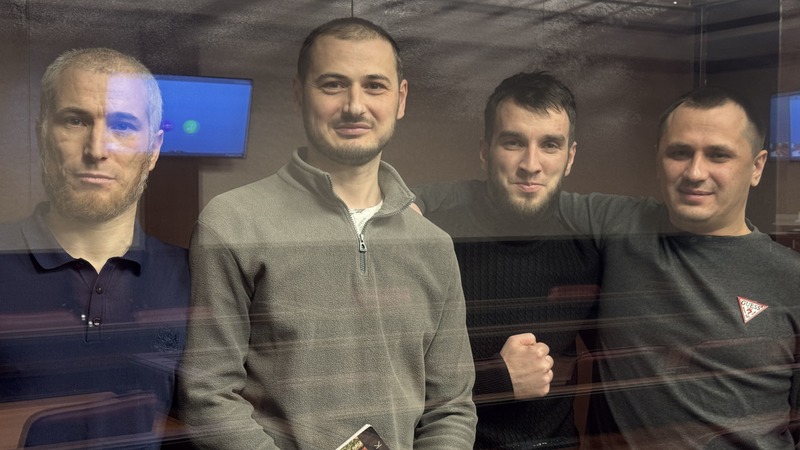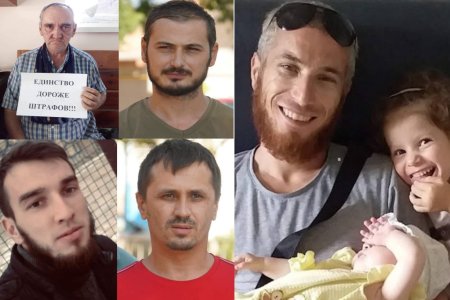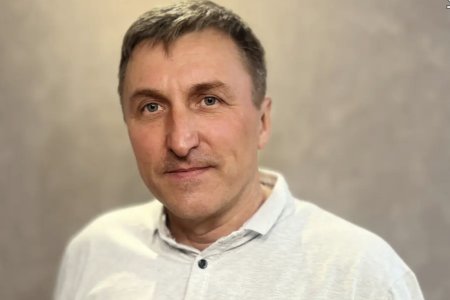
Four Crimean Tatar political prisoners should have been freed from custody on 22 September 2025 after a Russian court was forced to announce a retrial. Instead, a feeble excuse was given for the about-turn, and the men’s detention was extended until the beginning of January 2026. This was despite the fact that the defence had shown that the four Crimean Solidarity journalists and activists have been imprisoned for 18 months without clearly defined charges, as demanded by Russia’s own legislation.
It would be difficult to pretend surprise that ‘judges’ from the Southern District Military Court are unwilling to confront the issue. Russia has been staging such ‘trials’ of Crimean Muslims, most of them members of the Crimean Tatar human rights movement, since 2015, with the same flawed indictment used against over a hundred political prisoners currently serving or facing sentences of up to 20 years. Russia’s prosecutors and ‘judges’ have shown zero concern when reminded that the trials are in breach of international law and violate the men’s right to a fair trial. Here, however, the defence are legitimately asking why the indictment flagrantly ignores the requirement of Russian legislation, and that is harder to ignore.
Crimean Solidarity civic journalists Rustem Osmanov (b. 1989)’ and Aziz Azizov (b. 1995) and activists Mustafa Abduramanov (b. 1988); and Memet Liumanov (b. 1988) have been imprisoned since armed searches of the men’s homes on 5 March 2024 which made no pretence of looking for anything except ‘prohibited religious literature’. The men are essentially accused only of unproven ‘involvement in Hizb ut-Tahrir , a peaceful, if controversial, Muslim organization which is legal in Ukraine. A flawed and secretive supreme court ruling from February 2003, declaring Hizb ut-Tahrir ‘terrorist’, without any explanation, has been used ever since 2015 to accuse Crimean Muslims of ‘involvement in a terrorist organization’, under Article 205.5 § 2 of Russia’s criminal code (or Article 205.5 § 1 - of ‘organizing’ such a fictitious organization), as well as of the no less surreal charge of ‘‘planning to violently seize power’ (Article 278).
In this case, as in others, lawyer Emil Kurbedinov and his colleagues have pointed out that the charges are illegal since the supreme court ruling predated the introduction in 2006 of Russia’s law on countering terrorism. This clearly defines what is meant, according to Russian legislation, by ‘terrorism’ and ‘a terrorist organization’. Kurbedinov explained to Crimean Solidarity that the indictment against the four Crimean Tatars does not meet the requirements of norms like Article 205.5. These are called ‘blanket norms’ as they do not, in themselves, provide a clear description of what actions or behaviour are covered by its scope, but rather sends the reader to the relevant law, namely the federal law ‘On countering terrorism’, from 2006. Article 205.5 § 2, for example, refers to “Participation in the activities of an organization which, in accordance with Russian Federation legislation, is recognized as terrorist”. The defence insists that the indictment must point to the specific articles and norms of the law on countering terrorism which the defendants are alleged to have violated. It does not, with the charges essentially hinging purely on the fact of the 2003 supreme court ruling. “In 2003, the sate had a certain logic in its recognition of an organization as terrorist, however since 2006 there has been a new law which has clearly specified what terrorism is and which clearly defines the procedure for declaring an organization terrorism. With respect to Hizb ut-Tahrir, this [recognition in accordance with the new law] was not carried out.” Kurbedinov pointed out in the concluding debate of another trial.
A new hearing has now been scheduled for 14 October 2025, with witnesses for the prosecution to (again) be questioned. Most of these are so-called ‘secret witnesses’ whom ‘judges’ from the Southern District Military Court invariably allow to remain anonymous and even have their voices altered, despite the lack of any evidence that they would face danger if they ‘testified’ openly. The defence are convinced that the vast majority of these are state agents, and that this is the reason for the secrecy. There is considerable evidence in Bakhchysarai, where all four men are from, that at least one of the supposed ‘secret witnesses’ has ‘migrated’ from one political trial to another for the past eight years. The ‘judges’ do not only agree to anonymous witnesses without any justification, but also systematically block questions from the defence aimed solely at demonstrating that the ‘witnesses’ are lying. The ‘witnesses’ are, typically, able to repeat parts of the indictment virtually verbatim, while being unable to answer the simplest question about the defendant, how or where they met, etc.
As well as being profoundly flawed for the reasons above, Russia’s ‘Hizb ut-Tahrir trials’ in occupied Crimea are very clearly aimed at crushing the Crimean Solidarity human rights movement which arose in response to the ever-increasing number of Crimean political prisoners. Many victims were first subjected to harassment and administrative prosecution for peaceful acts of solidarity with political prisoners and their families. When that failed to silence them, the FSB staged armed raids, with the men taken away and charged, under Russian terrorism legislation, with ‘involvement’ in an organization that is perfectly legal in Ukraine. Rustem Osmanov had earlier faced persecution for his role as a Crimean Solidarity journalist but had not refused to let this stop him reporting political persecution. Aziz Azizov; Mustafa Abduramanov, and Memet Liumanov had also ignored harassment and continued to attend political trials and taking part in other peaceful actions in defence of victims of persecution.



